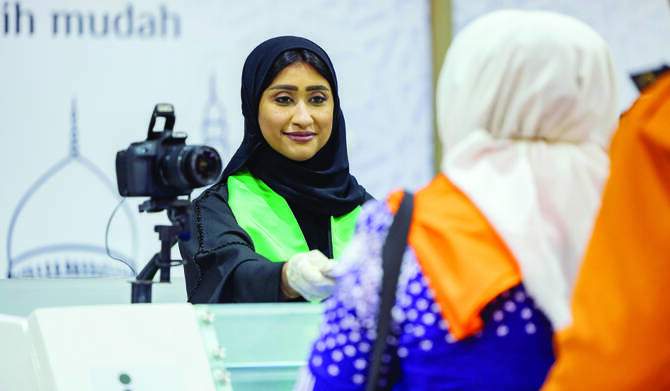
- ARAB NEWS
- 19 Jul 2025

RIYADH: The Makkah Route Initiative by Saudi Arabia’s Ministry of Interior aims to make the once-in-a-lifetime journey easy for foreign pilgrims by enhancing their Hajj experience.
Now in its seventh year, the initiative is carried out by the ministry as part of the Vision 2030 Pilgrim Experience Program.
The ministry recently announced that more than 1 million pilgrims have benefited from the initiative since its launch, reaffirming the Kingdom’s commitment to serving Hajj pilgrims.

Established in 2018 and activated in 2019, the initiative enables pilgrims to complete their entry procedures to Saudi Arabia at their home countries’ airports.
Upon arrival in the Kingdom, pilgrims and their luggage are directly transported to their accommodation in the two holy cities of Makkah and Madinah, avoiding long lines and wait times at the airport.
Pilgrims arriving under the initiative spend only a few minutes at the Saudi immigration counters.
It includes dedicated lounges at 12 airports in eight countries — Indonesia, Malaysia, Pakistan, Bangladesh, Turkiye, Morocco, the Maldives and Cote d’Ivoire.
Malaysian pilgrim Hasna Hamza, who arrived for her pilgrimage last week, expressed her heartfelt thanks to the Saudi government for facilitating the journey.

Aged 74, she described the process as “smooth, respectful and deeply spiritual.”
She completed her travel procedures in Kuala Lumpur — including biometric collection, health screening, passport validation and luggage processing.
Upon arrival in Madinah, she and fellow pilgrims were swiftly transferred to their accommodation with their luggage.

Naved Hasan, a Pakistani pilgrim told Arab News that the initiative enables pilgrims “to be fully committed to performing one of their holiest duties with peace of mind.”
Mohammed Mubarak, a Bangladeshi pilgrim, added: “Completing all the necessary procedures before leaving my home country saved me a lot of time and stress.”
The first group of 414 Bangladeshi pilgrims arrived at the Hajj Terminal of King Abdulaziz International Airport in Jeddah on April 29.

Bangladesh Ambassador to Saudi Arabia M. Delwar Hossain welcomed them at the airport, and assured that the Bangladesh Embassy, Consulate and Bangladesh Hajj Mission were available to support them.
The program, led by multilingual national teams and supported by advanced technology, ensures a smooth and spiritual experience for all pilgrims.
Underscoring Saudi Arabia’s commitment to pilgrims through the Makkah Route Initiative, Saudi Ambassador to Morocco Dr. Sami Al-Saleh said the initiative “streamlines Hajj procedures and ensures a peaceful journey for pilgrims traveling from their home countries to the Kingdom.”

Al-Saleh added that the widely embraced initiative in Morocco enables pilgrims to fulfill all travel procedures at Mohammed V International Airport in their home country.
Saudi Arabia launched the Makkah Route Initiative in the Maldives this week, making it the eighth country to benefit.
Officially inaugurating the initiative at Velana International Airport in Male on Monday, Maldives President Mohamed Muizzu presented the passport to the first pilgrim from a group of 234.
The ministries of media, health and Hajj and Umrah in Saudi Arabia run campaigns through social media to provide all the necessary information.
The Ministry of Hajj has reiterated that all intending to perform Hajj must obtain an official permit through the “Nusuk” platform, in technical integration with the unified digital platform for Hajj permits, “Tasreeh.”
The ministry emphasized that compliance with regulations is essential to protect the safety and well-being of pilgrims, and to ensure a smooth and secure Hajj experience.
In an official statement, the ministry stressed that no separate visa category — other than the official Hajj visa — grants its holder the right to perform Hajj.
Hefty fines up to SR100,000 ($26,000) will be enforced for anyone attempting to perform Hajj without the necessary visa.
The Makkah Route Initiative is run in coordination with several government entities, including the Ministry of Foreign Affairs, Ministry of Health, Ministry of Hajj and Umrah, and Ministry of Media, the Saudi Data and AI Authority, the Zakat, Tax and Customs Authority, the General Authority for Awqaf, the Pilgrim Experience Program and the General Directorate of Passports.